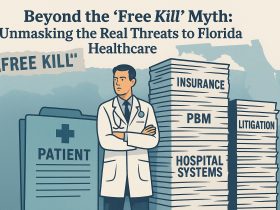By Sean C. Orr, M.D.
3-Minute Read
Legislative Shift – What You Need to Know
As of July 1, 2025, Florida’s Senate Bill 1768 (House Bill 1617) officially allows licensed MDs and DOs to administer non‑FDA‑approved stem cell therapies for orthopedics, wound care, and pain management. The legislation mandates cell sourcing from FDA-registered, CGMP-compliant, accredited facilities and bans embryonic or post‑abortion fetal sources. Disclosure and informed-consent requirements are embedded in law, with failure to comply potentially triggering felony charges, medical-board sanctions, or disciplinary action.
Safety Concerns & Medical-Legal Risks
Despite its intent to bring structure to regenerative medicine, critics caution that Florida now risks becoming a haven for unproven and potentially harmful treatments. Historical cases, such as patients blinded after fat‑derived cell injections in Florida clinics, underscore that unregulated therapies can lead to devastating outcomes. The emergence of stem-cell clinics administered by non-specialists or with weak laboratory oversight adds friction to safety standards.
Neuroeconomic & Disruptive Innovation Implications
In today’s neuroeconomy, Florida is poised to disrupt traditional care flows by commodifying regenerative medicine—leveraging neuroplaybooks to win consumers through the promise of a better future. Dissatisfaction with the legacy healthcare system is at an all-time high. This legislation fosters a new demand curve, bringing patients in by belief economy more than evidence—what you’re building in your practice can shape the abundance mindset in health, repurposing this turbulence into an opportunity to demonstrate better outcomes through rigorous protocols, data-sharing, outcomes tracking, and predictive analytics.
Medical-Legal & Regulatory Meta-Modern Perspective
From a metamodern perspective, Florida’s law embodies oscillation between optimism for accelerated access and skepticism about safety. It reflects both postmodern distrust in federal oversight and a nouveau faith in physician‑led innovation. Yet the medico‑legal structure is thin: Patients may provide informed consent, but state enforcement capacity is indeterminate, and oversight depends heavily on providers’ ethical commitments. This may create a gray zone where legal compliance may come down to culture, not code.
Action Points for Brain-Health Clinicians
Florida doctors specializing in neurology, pain management, and brain health can respond proactively:
Implement evidence‑based protocols before offering regenerative options (e.g. ensure cell viability testing, post‑procedure outcomes tracking, objective biometrics).
Use informed consent as a framing tool: Thoroughly explain risks, placebo effects, and data limitations to safeguard trust.
Advocate for and contribute to rigorous outcome registries and peer‑reviewed studies to build credibility in this new sector.
Position yourself as a thought leader bridging ethical innovation and scientific rigor: Disrupt yet protect.
Collaborate with legal advisors familiar with Florida healthcare law to stay ahead of enforcement risks.
Summary
Florida has flipped the regulatory script, allowing physician‑administered, non‑FDA-approved stem cell therapies under certain conditions. While this could foster medical innovation and a more abundant treatment economy, it simultaneously opens medico‑legal exposure and patient safety challenges. For you and your practice, the ethical imperative is clear: Lead with empirical rigor, neuroeconomic awareness, and a metamodern balance between innovation and avoiding harm.







Leave a Reply